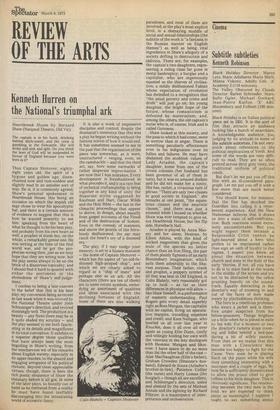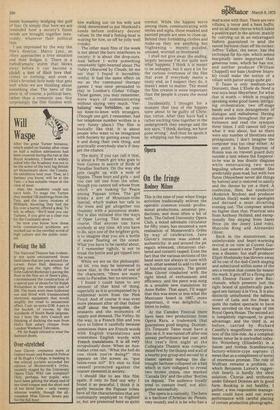Cinema
Subtitle subtleties
Kenneth Robinson
Black Holiday Director: Marco Leto. Stars: Adalberto Maria Merli, Milena Vokotic, Adolfo Celi. 'A' Academy 2 (110 minutes).
The Valley Obscured by Clouds Director: Barbet Schroeder. Stars: Bulle Ogler, Michael Gothard, Jean-Pierre Kalfon. 'X' ABC Bloomsbury and Fulham (100 minutes).
Black Holiday is an Italian political piece set in 1931. It is the sort of film that attracts an audience looking like a bunch of anarchists. A knowledgeable audience, too, judging by its attitude to some of the subtitle subtleties. I'm not very quick about references to the .political implications of Verdi. And some of the words are very difficult to read. They are so often printed across dirty grey vests, the traditional uniform of political rebels.
But don't let me put you off this film with an ill-considered paragraph. Let me put you off it with a few more that are much better considered.
You should know, for instance, that the film has shocked the Guardian into calling it a reverberent experience. And the New Statesman believes that it draws us into a state of self-confrontation. Both reactions sound extremely uncomfortable. But you might expect them because a Responsible Critic cannot be light-hearted about a hero who prefers to be imprisoned rather than sign an oath of loyalty to the regime. I expect you know all about the situation between church and state in the Italy of the early 'thirties. If not, all you have to do is to stare hard at the words in the middle of the screen and try not to be distracted by the cellos grunting heavily on the soundtrack. Equally distracting is the director's way of zooming in and out of the faces of men made weary by platitudinous thinking.
The hero is a rebellious professor who wears a jacket and is therefore under suspicion from his fellow-prisoners. Things brighten up a little when he is joined in exile by hi S wife. For a moment or two the director's camera stops zooming and hides behind a bed-post during a bit of wifely passion. From then on we realise that this man with a Conscience may become too happy to fight for the Cause. Very soon he is playing Bach on the piano while his wife does something interesting with a saucepan and a couple of eggs. By now he is sufficiently domesticated to .allow the prison chief to give toffees to his little daughter. This is obviously significant. The relationship between the two men is the kind we are expected to think about as meaningful. I suppose I ought to say something about
latent humanity bridging the gulf of fear. Or simply that here we are reminded how a society's finest minds are brought together inexorably, whatever their political bias.
I am impressed by the way the film's director, Marco Leto, so often approaches a trite situation and then dodges it. ' There is a melodramatic storm that blows away before it can become a cliche; a hint of illicit love that comes to nothing, and even a child's feverish little body that gets well while we are thinking about something else. The hero of the piece is, of course, a political hero, rather than a romantic one. Not surprisingly the film finishes with him walking out on his wife and child, determined to put Mankind's needs before ordinary decent values. In the end a fishing-boat is waiting for him, so off he jolly well trotsky.
The other main film of the week is not about the born interferers in society; it is about the drop-outs. And before I write something unsuitably light-hearted about The Valley Obscured by Clouds, let me say that I found it incredibly restful. It had the same effect on me as the communal therapy games I was once persuaded to play in London's Global Village. Those games, you may remember, were ways of communicating without saying very much. 'Verbalising' was forbidden, as you sat knee-to-knee with strangers. (Though one girl, I remember, had her telephone number written in a very funny place.) The film is basically like that. It is about people who want to be Integrated with Society by getting away from it and doing their own thing, and practically everybody else's if they get the chance.
The story, if you can call it that, is about a French girl who goes to New Guinea in search of Birds of Paradise feathers. On the way she gets caught up with a mob of hippies. These boys and girls — and you can tell one from the other, though you cannot tell whose from which — are looking for Peace, among Papuan tribes. The girl drinks a sort of Mountain-tribe Special, which makes her talk to the trees and get altogether too chummy with a poisonous snake. She is also initiated into the ways of Open Loving. This means, of course, that anyone can have anybody at any time. All you have to do, says one of the brighter girls, is to imagine that you are a bottle of water floating on the ocean.What you have to be careful about, if I remember rightly, is not to break the bottle and get tipped into the ocean.
While we are on the philosophical bit, you may be interested to know that, in the words of one of the characters, "there are many exits to Paradise, but no entrance."
I found I could listen to any amount of that kind of thing, especially as it is accompanied by a subliminal score from the Pink Floyd. And of course it was even' more pleasant after all that Italian stuff about the bourgoisie, the peasants and the economics of supply and demand, The Valley, by the way, is a French film and you have to follow it carefully because sometimes there are French words with English translations and sometimes English words with French translations. It is all very scrupulously done. When an Australian cries out, "What the hell do you think you're doing?" this appears on the screen as, "que faites-vous ici?" It's nice to findoneself protected against the coarser elements in society.
I should like to see this film again, if only to find out why I found it so peaceful. I think it is partly because the Papuan tribes have all the characteristics that are custOmarily employed to frighten' us, but are presented here as quite. normal. While the hippies move among them, communicating with smiles and signs, these masked and painted people are seen in close-up. Behind their forbidding clothes and make-up they are anything but frightening — merely puzzled, amused, worried or interested.
I shall not give away the ending, largely because I'm not quite sure what happens. I think it is meant to be unhappy, but it says a lot for the curious overtones of the film that even if everybody meets a nasty end, as I suspect they do, it doesn't seem to matter. The mood the film creates is more important than the people it creats the mood with.
Incidentally, I thought for a moment that two of the hippies were about to be guilty of Christian virtue. After they have had a rather exciting time together in the undergrowth they emerge and the boy says, "I think, darling, we have gone wrong." And then he spoils it by whipping out his compass.











































 Previous page
Previous page